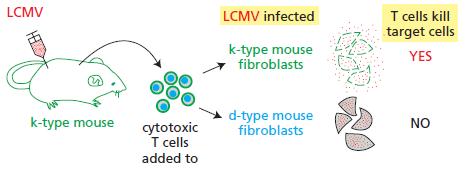Working out the rules by which T cells interact with their target cells was complicated. Some of
Question:
Working out the rules by which T cells interact with their target cells was complicated. Some of the key observations came from studying the way cytotoxic T cells killed cells infected with choriomeningitis virus (LCMV). Cytotoxic T cells derived from mice expressing “k-type” class I MHC proteins lysed LCMV-infected cells expressing the same k-type MHC protein, but they did not lyse infected cells from mice expressing “d-type” class I MHC proteins (Figure Q24–2). Similarly, cytotoxic T cells from d-type mice lysed infected d-type cells, but not infected k-type cells. LCMV can kill both k-type and d-type mice.
A. If homozygous d-type mice were bred to homozygous k-type mice to generate d-type/k-type heterozygous progeny, would you expect that cytotoxic T cells from these heterozygotes, when infected with LCMV, to be able to lyse infected d-type cells? How about infected k-type cells? Explain your answers.
B. Oddly enough, LCMV infection does not kill mice that lack a thymus—such as “nude” mice, so called because they also lack hair. If a thymus is transplanted back into a nude mouse, it will die when infected with LCMV. Suppose that a d-type/k-type heterozygous nude mouse was given a thymus from an d-type donor. Would you expect its cytotoxic T cells to be able to lyse infected d-type cells? How about infected k-type cells? Explain your answers.
Figure Q24-2

Step by Step Answer:

Molecular Biology Of The Cell
ISBN: 9780815344322
6th Edition
Authors: Bruce Alberts, Alexander D. Johnson, Julian Lewis, David Morgan, Martin Raff, Keith Roberts, Peter Walter




